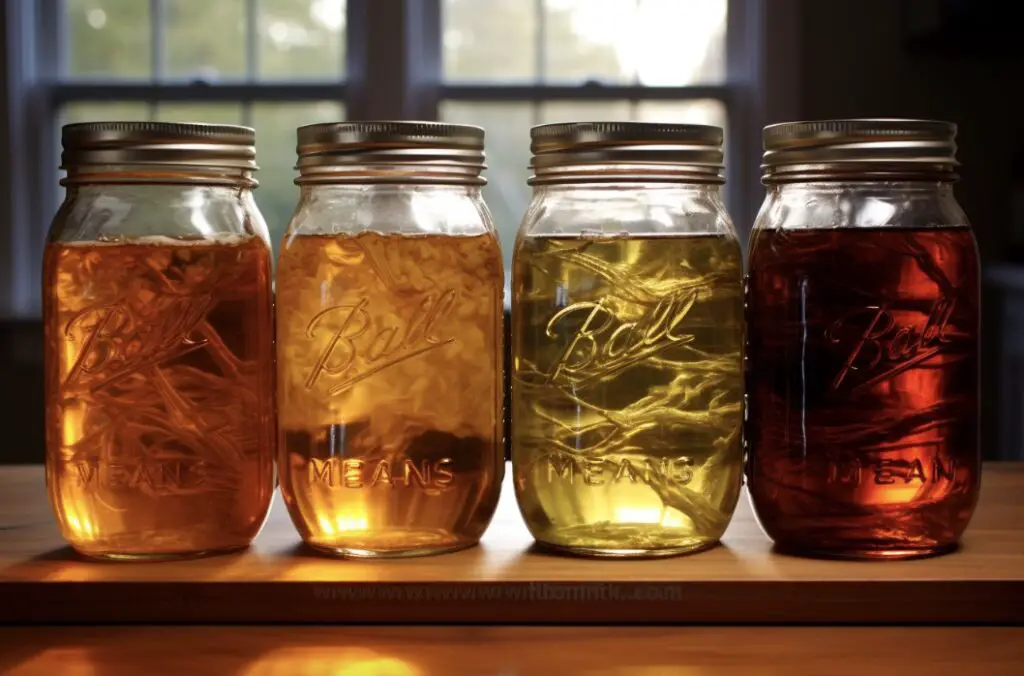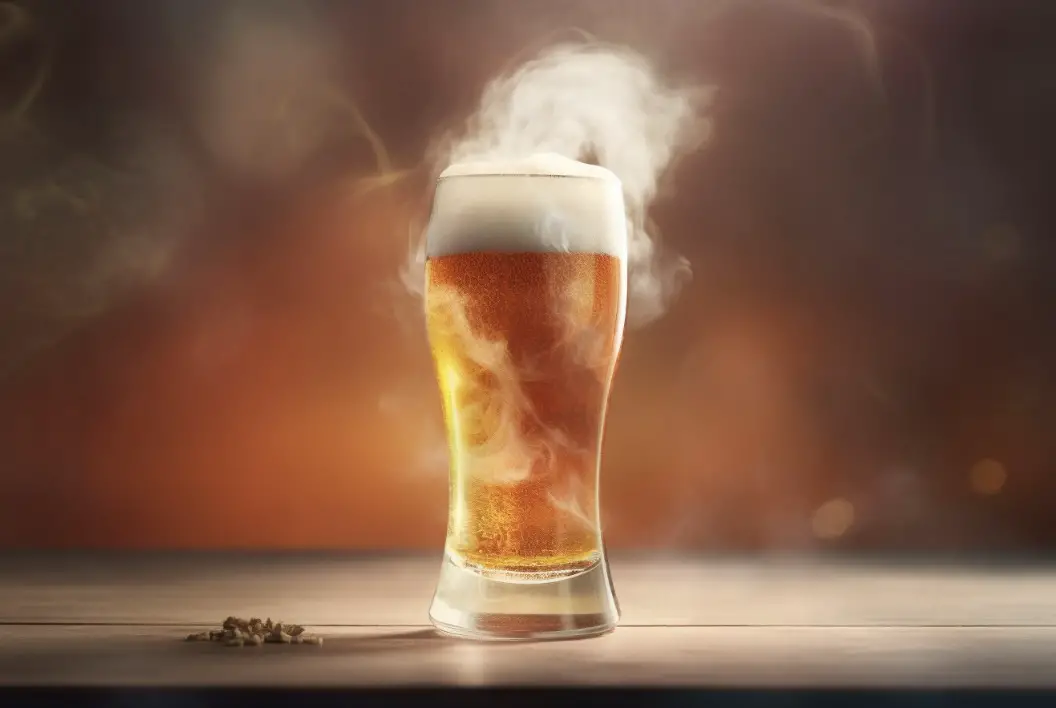Does cider go bad in heat? Yes, cider can go bad when exposed to high temperatures for prolonged periods of time.
Heat can cause the cider to spoil, lose its flavor, and even become dangerous to consume.
In this blog post, I will share my first-hand experience and personal advice on how to properly store cider and prevent it from going bad in heat.
We will explore the factors affecting cider’s quality and shelf life, and the signs of spoilage to look out for. So, let’s dive in and learn more about the effects of heat on cider.
What is Cider?
Cider, also known as hard cider in the United States, is an alcoholic beverage made from the fermented juice of apples. It has been enjoyed for centuries and is especially popular in Europe and North America.

Cider can vary in taste, color, and alcohol content, depending on the apples used, the fermentation process, and any additional ingredients or flavors added.
How is Cider Made?
Cider is made through a process called fermentation. Apples are harvested, washed, and crushed to extract their juice.
The juice is then mixed with yeast, which consumes the natural sugars in the apple juice and produces alcohol and carbon dioxide as byproducts.
The fermentation process usually takes a few weeks to a couple of months, depending on the desired flavor and alcohol content. The cider is then bottled, and may be aged further to develop more complex flavors.
The Effects of Heat on Cider
Heat can have detrimental effects on cider, impacting its taste, aroma, and overall quality. Here are some of the ways heat can affect cider:
Flavor and Aroma Degradation
Heat can cause the delicate flavors and aromas in cider to break down, resulting in a less enjoyable drinking experience. The chemical reactions that occur at high temperatures can lead to the development of off-flavors and aromas, which can make the cider taste stale or even spoiled.
Oxidation
Heat can cause the cider to oxidize, which means that the alcohol in the cider reacts with oxygen. This can create off-flavors and aromas, and can cause the cider to lose its freshness and become flat or stale. Oxidation can also lead to the formation of acetic acid, which can give the cider a vinegar-like taste.
Spoilage
High temperatures can cause the growth of spoilage microorganisms, such as bacteria and mold. These microorganisms can produce off-flavors and aromas, and can even make the cider unsafe to consume. Spoilage is more likely to occur in unpasteurized or unfiltered ciders, as these types of ciders still contain live yeast and other microorganisms.
Proper Storage of Cider
To prevent cider from going bad in heat, it is important to store it properly. Here are some tips on how to store cider to maintain its quality and shelf life:
Keep it Cool
Cider should be stored in a cool, dark place, ideally between 50-60°F (10-15°C). This will help to slow down the chemical reactions and microbial growth that can cause the cider to spoil.
Keep it Dark
Exposure to light can also cause cider to degrade, so it is best to store it in a dark place or in opaque containers. Light can cause the formation of off-flavors and aromas, and can also cause the cider to become discolored.
Keep it Sealed
Make sure that the cider is properly sealed, whether in a bottle with a tight-fitting cap or cork, or in a keg or growler. Keeping the cider sealed will help to prevent oxidation, which can cause the cider to go bad.
Store Upright
Cider should be stored upright, rather than on its side, to minimize the surface area exposed to oxygen. This will help to reduce the risk of oxidation and spoilage.

Signs of Spoiled Cider
If you suspect that your cider has been exposed to heat or other adverse conditions, here are some signs of spoilage to look out for:
Unpleasant Odors
Spoiled cider may have off-odors, such as a musty, moldy, or vinegar-like smell. These odors can be a sign that the cider has been contaminated with spoilage microorganisms or has undergone undesirable chemical reactions.
Discoloration
Cider that has been exposed to heat or light may become discolored, turning brown or cloudy. This can be a sign that the cider has degraded and may not taste as good as it should.
Unusual Flavors
Cider that has gone bad may have off-flavors, such as a sour, bitter, or metallic taste. These flavors can indicate that the cider has spoiled or has been contaminated with spoilage microorganisms.
Bulging or Leaking Containers
If the container holding the cider is bulging or leaking, this can be a sign that the cider has been contaminated with gas-producing microorganisms. This can cause the cider to spoil and can even be dangerous, as the build-up of pressure can cause the container to burst.
Conclusion
In conclusion, cider can go bad in heat, and it is important to store it properly to maintain its quality and shelf life. To prevent cider from going bad, follow these tips:
1. Store cider in a cool, dark place.
2. Keep the temperature between 50-60°F (10-15°C).
3. Store cider in opaque containers to protect it from light.
4. Make sure the cider is properly sealed to prevent oxidation.
5. Store cider upright to minimize the surface area exposed to oxygen.
6. Be aware of the signs of spoilage, such as unpleasant odors, discoloration, or unusual flavors.
7. Avoid storing cider near heat sources, such as radiators or direct sunlight.
8. Check the container for bulging or leaking before consuming the cider.
9. Remember that unpasteurized or unfiltered ciders may be more susceptible to spoilage.
10. If in doubt, do not consume cider that you suspect may have gone bad.
By following these guidelines, you can ensure that your cider stays fresh and delicious, and can be enjoyed safely and responsibly. Cheers!
FAQs
Can you leave cider in a hot car?
It is not recommended to leave cider in a hot car as it can spoil and potentially become unsafe to consume. Heat can accelerate the fermentation process and cause the cider to become over-fermented, leading to a change in taste and potentially causing the bottle to burst. It is best to store cider in a cool, dark place.
How long before cider goes bad?
Cider can last for several weeks to a few months if stored properly in the refrigerator, but it can go bad within a few days if left at room temperature or exposed to air.
Does cider go bad in a hot car?
Yes, cider can go bad in a hot car, especially if it is left in direct sunlight or exposed to high temperatures for an extended period of time. Heat can cause the cider to ferment or spoil, resulting in a change in taste, texture, and quality. It is best to store cider in a cool, dry place to maintain its freshness.
Can you drink cider 2 years out of date?
No, it is not recommended to drink cider that is 2 years out of date as it may have gone bad and could cause food poisoning or other health issues. It is best to always check the expiration date and consume cider before it expires.
How quickly does cider go bad?
Cider can go bad within a week if not stored properly. It should be kept refrigerated and consumed within a few days of opening.
Is it OK to drink expired cider?
No, it is not recommended to drink expired cider as it may have undergone fermentation or bacterial growth, leading to changes in taste and potentially harmful effects on health.




